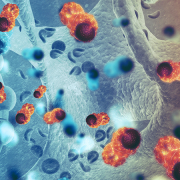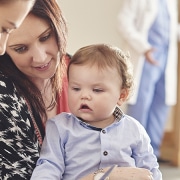Genomics England to launch the Generation Study
This winter sees the start of the Generation Study, which will explore the benefits and challenges of sequencing the genomes of 100,000 newborns
The new research study is part of the Newborn Genomes Programme that was announced in 2022 by Genomics England (who ran the 100,000 Genomes Project) and will be run in partnership with the NHS.
Currently, thousands of children are born every year in the UK with a rare but treatable genetic condition. The study will use whole genome sequencing to look for rare genetic conditions in newborns, enabling treatment to begin sooner.
“Earlier identification of rare conditions and treatment will give babies the best possible start in life,” said NHS England Chief Scientific Officer and Senior Responsible Officer for Genomics, Professor Dame Sue Hill.
How will it work?
Parents will be invited to take part during pregnancy and give their consent shortly before birth, with support from funded study teams at a range of NHS hospitals in England. A sample will be taken shortly after birth and each participating newborn will have their whole genome sequenced. Within that data, over 500 genes will be examined, looking for genetic variants associated with 223 different genetic conditions. Decisions about which conditions to screen for have been informed by a wide-ranging consultation, and the list may expand as the project continues.
“We’ll continue to revisit both the principles and the list of conditions to make sure we are keeping up with emerging evidence, advancements in genomics and treatment for rare conditions, as well as continuing to engage with the public, specialists and families with rare conditions,” said Genomics England Clinical Lead for Genetic Counselling, Amanda Pichini.
Genomics England expect that around 500–1,000 of the babies in the study will receive a suspected diagnosis. Those children will receive further testing and treatment, if necessary, through normal NHS care pathways, but critically at an earlier stage than if they had been diagnosed when symptoms appeared.
Not to be confused with…
The current NHS newborn blood spot screening programme (commonly known as the ‘heel prick test’) will carry on in parallel, as an important public health initiative. This test helps identify babies who have any of nine serious conditions, most of which are caused by genetic variants. With both the Generation Study and the blood spot screening programme, further testing is needed to make a definitive diagnosis.
The study is also separate from whole genome sequencing approaches being used for critically ill children in the NHS Genomic Medicine Service. The aim of the Generation Study is to be proactive and to make diagnoses before the children become ill, as such the newborns who will take part will be apparently healthy.
The future of newborn screening
As part of parents’ consent in the Generation Study, babies’ genomes will be de-identified and added to the National Genomic Research Library. This will provide invaluable data for researchers to improve our understanding of health and disease, develop new diagnostics and treatments, and look at ways that current therapies can be improved or repurposed.
Results from the study will be used to decide if whole genome sequencing should become part of mainstream NHS practice for newborn screening in the future. If, as it is hoped, this approach leads to better health outcomes for children with treatable genetic conditions, it could be adopted across the NHS in years to come.









